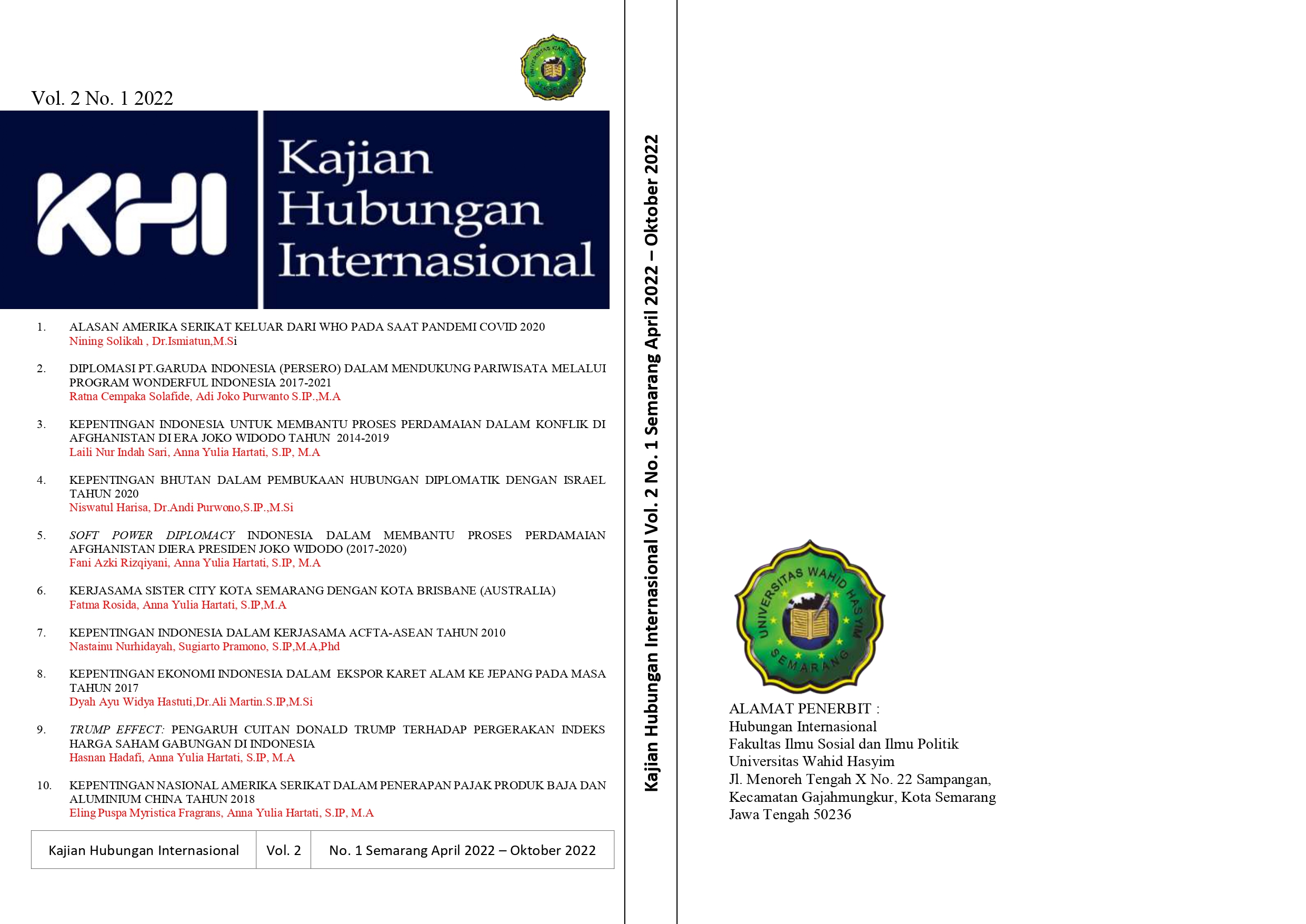Alasan Amerika Serikat Keluar Dari WHO Pada Saat Pandemi Covid 2020
DOI:
https://doi.org/10.31942/khi.2023.2.1.7569Keywords:
foreign policy, covid 19, United States governmentAbstract
This study aims to analyze the reasons for the United States leaving the WHO during the COVID-19 pandemic in 2020 and focuses on the United States' foreign policy. This thesis research is qualitative descriptive with descriptive analysis method. This research uses documentation data collection techniques with secondary data sources. Researchers collected data from various sources from news and other media documentation regarding the spread of covid 19 in 2019. And the policies of the United States president Donald Trump who made contradictory policies in the midst of the covid 19 pandemic. Trump qualifies to be classified as a risk-prefering type leader or willing to choose certain policies that have a high level of risk. During the Covid-19 period, which began in December 2019 and has continued until now, has infected as many as 13.5 million people in 188 countries (data as of mid-July 2020), global geopolitical competition does not show a tendency to subside either. Even China and the United States are actually involved in accusing each other and fighting propaganda about the origin of the virus. The conflict then escalated to the cutting stage. The United States is now the largest funding country for WHO. Deputy assistant secretary of state for international organizations Nerissa Cook said while at the White House that the WHO needed reforms and that it started by demonstrating its independence from the Chinese Communist Party. Nerissa Cook also said the United States wanted greater transparency and accountability with the WHO. He hopes that there will be a change in WHO management so that it focuses more on prevention and detection of the COVID-19 pandemic.References
Lewis, Michael, 2018. The Fifth Risk: Undoing Democracy. NewYork: W. W. Norton & Company.
Patterson, Thomas E., 2018, We the People: An Introduction to American Government. New York: McGraw-Hill.
Trump, Mary L., 2020. Too Much and Never Enough: How My Family Createdthe World’s Most Dangerous Man. New York: Simon & Schuster.
Wilson, James Q., et al., 2018. American Government Institutions & Policies 13th Edition.Boston: Cengage Learning.
Youde, Jeremy, 2010. The International Health Regulations: Biopolitical Surveillance and Public Health in International Politics. New York:Palgrave Macmillan US.
Aivanni, Nur. “PBB Kritik Trump Soal Dana WHO, Media Indonesia, 16 April 2020, hal. 14.
Amalia, Happy Amanda. “Tiongkok Tambah Kontribusi US$ 30 Juta ke WHO.â€Investor Daily, 24 April 2020, hal. 2.
Azmi, Fuad. "Perang Dagang Amerika Serikat dan Tiongkok di Masa Pandemik COVID-19." Padjadjaran Journal of International Relations 3.1 (2021):32-48.
Azmi, F. (2021). Perang Dagang Amerika Serikat dan Tiongkok di MasaPandemik COVID-19. Padjadjaran Journal of International Relations,3(1), 32-48.
AZMI, Fuad. Perang Dagang Amerika Serikat dan Tiongkok di Masa Pandemik COVID-19. Padjadjaran Journal of International Relations, 2021, 3.1:32-48.
Joe Biden: Diplomasi Menjadi Inti dari Kebijakan Luar Negeri ASâ€,https://www.liputan6.com/global/read/4475885/joebidendiplomasimenjadi-inti-darikebijakan-luar-negeri-as, diakses 6 Februari 2021.
BBC. “Coronavirus: China Accuses US of Causing Panic and Spreading Fear.†3 Februari 2020.
BBC. “Coronavirus: Trump Accuses WHO of Being a ‘Puppet of China’,†18 Mei 2020.
Mirvis, Philip, 2020. “Reflections: US Coronavirus Crisis Management—Learning from Failure Donald Trump and Moreâ€, Journal of Change Management 2020, JanuaryApril.
Gamey, Yavin, 2020. “Donald Trump: a political determinant of COVID-19â€,BMJ 2020; 369:m1643.
Rothstein, Mark A., 2020. “The Coronavirus Pandemic: Public Health and American Valuesâ€, The Journal of Law, Medicine & Ethics 48(2):354359.
Rutledge, Paul E., 2020. “Trump, COVID-19, and the War on Expertiseâ€, The American Review of Public Administration, 50(6-7): 505-511.
Gerstein, Daniel M., 2020. “Assessing the US government response to the coronavirusâ€, Bulletin of the Atomic Scientists, 76(4): 166-174.
Beckwith, Ryan T. “Read Donald Trump’s ‘America First’ Foreign PolicySpeech,†27 April 2016, https://time.com/4309786/read-donald-trumpsamerica-first-foreignpolicy-speech/, diakses pada 9 Agustus 2020.
Betsy, Klein and Jennifer Hansler, “Trump halt World Health Organization funding over handling of coronavirus outbreak,†cnn.com, 15 April 2020,
https://edition.cnn.com/2020/04/14/politics/donald-trump-worldhealthorganization-fundingcoronavirus/index.html, diakses 17 April2020.
Christensen, Thomas J. A Modern Tragedy? Covid-19 and US-China Relations Brookings Institution, 2020.
Crossley, Gabriel. “China Accuses US Scaremongering Over Coronavirus,†3 Februari 2020, https://uk.reuters.com/ article/uk-china-health-usa/chinaaccusesu-s-of-scaremongering-over coronavirusi, diakses pada 12 Agustus 2020
Cueto, Marcos, et al., The WHO: A History.Cambridge: Cambridge University Press,2019.
Danner, Lukas K. China’s Grand Strategy, Contradictory Foreign Policy?. Cham: Palgrave Macmillan, 2018.
https://www.bbc.com/news/health-5267 9329, diakses pada 12 Agustus 2020.
https://www.bbc.com/news/world-asia-china-51353279, diakses pada 12 agustus 2020.
https://www.who.int/docs/defaultsource/coronaviruse/situationreports/20200415sitrep-86-covid-19.pdf?sfvrsn=c615ea20_6, diakses 17 April 2020.
https://www.who.int/docs/defaultsource/coronaviruse/situationreports/20200502-covid-19-sitrep-103.pdf?sfvrsn=d95e76d8_4, diakses 3 Mei 2020.
Satria, Lintar dan Kamran Dikarma. “Trump Tahan Iuran WHO.â€Republika, 16 April 2020, hal. 4.
WHO, “Situation Report 86,†who.int/emegencies/disease.com, 15 April 2020,
WHO, “Situation Report 103,â€who.int./emegencies/disease.com, 2 Mei 2020,
Downloads
Published
Issue
Section
License
The copyright of the received article shall be assigned to the journal as the publisher of the journal. The intended copyright includes the right to publish the article in various forms (including reprints). The journal maintains the publishing rights to the published articles. Therefore, the author must submit a statement of the Copyright Transfer Agreement.*)

This work is licensed under a Creative Commons Attribution-ShareAlike 4.0 International License. Â
In line with the license, authors and any users (readers and other researchers) are allowed to share and adapt the material. In addition, the material must be given appropriate credit, provided with a link to the license, and indicated if changes were made. If authors remix, transform or build upon the material, authors must distribute their contributions under the same license as the original.
________
*) Authors whose articles are accepted for publication will receive confirmation via email and send a Copyright Transfer Agreement.


